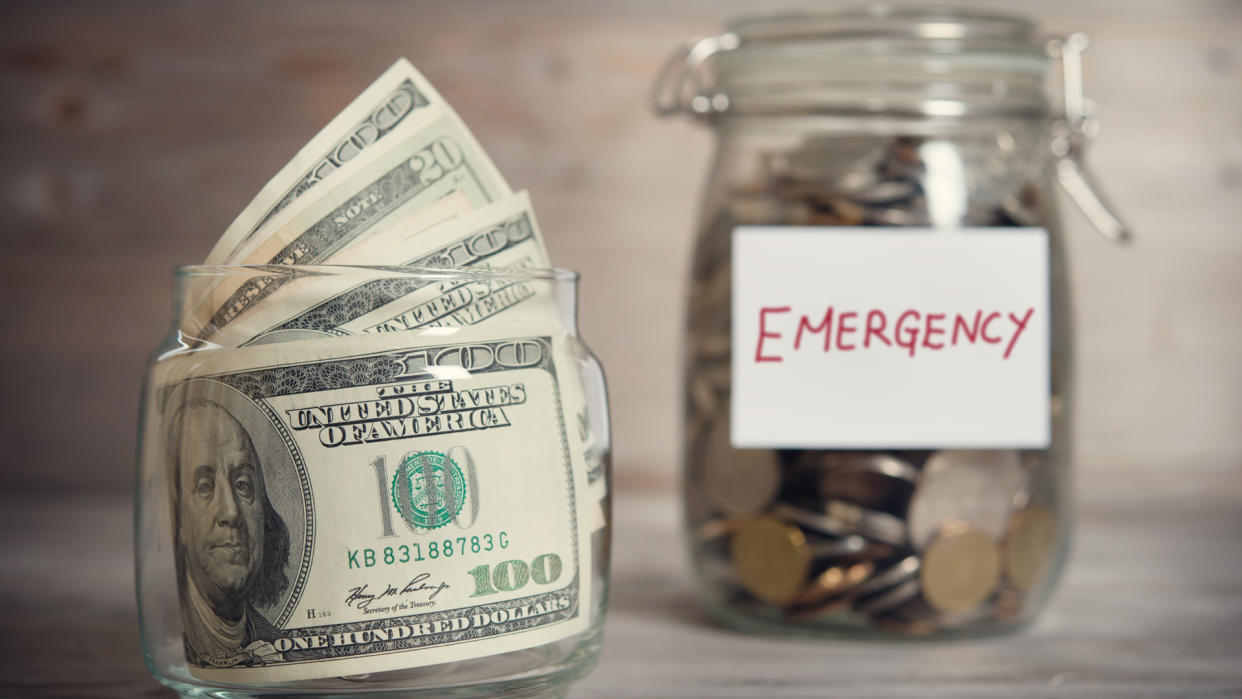Is Your Emergency Fund Too Big?

Having an emergency fund is of critical importance, as any finance expert will tell you. The ability to build one is a frequent pain point for Americans, millions of whom are living paycheck to paycheck.
Check Your $2 Bills: They Could Be Worth Upwards of $4,500
Find: 3 Signs You’re Serious About Raising Your Credit Score
A new survey by GOBankingRates, which consulted 1,005 adults in the U.S., found that 51% of respondents have no money saved for an emergency fund. The survey also found the following: 14% have $1,000 or less in their emergency fund; 11% have $1,001 to $3,000; 6% have $3,001 to $5,000; 5% have $5,001 to $7,000; 4% have $7,001 to $10,000 and 9% have $10,000 or more in their emergency fund.
Those who are holding onto higher amounts in their emergency funds prompt the question: Does there ever come a point where one should stop saving up for a crisis and start doing something else with their money? In other words, when is your emergency fund too big? And, if or when it is too big, what should you do instead of saving up?
Also, here is how to get started with an emergency fund.
Too Much Money Equals Too Little Rewards
When you have an ultra plush emergency fund, your money is just sitting there. It’s not growing or earning fat interest rates. It’s not even being used to pay down debt. It may as well be in a piggy bank.
“Having too large of an emergency fund may also lead to complacency,” said Donny Gamble, CEO of Retirement Investments. “If you know that you are always covered financially and don’t have to worry about creating a budget or living within your means, you may become less aware of how your spending affects your overall financial situation.”
How Much Should You Have in Your Emergency Fund? It Depends
There’s no one-size-fits-all answer to how much one should have in their emergency fund. It really depends.
“The truth is the size of your emergency fund should depend on several factors — your income level, job security, living expenses and family situation,” Gamble said. “For example, if you have a steady job with good pay, you may not need as large of an emergency fund as someone who is self-employed or has multiple sources of income. Likewise, those who are single or in a two-income household will likely require different amounts of savings than those in a larger family.”
Typically, finance experts recommend having at least three to six months’ worth of living expenses saved up in case of an emergency. This would cover basic expenses for that duration of time.
“Basic expenses would include all of the necessities — food, rent/mortgage, transportation, utilities,” said Michelle Robertson, a CPA, certified coach and the founder of Ms. Money and Math. “If you have several people relying on your income, then you may want closer to six months.”
Take Our Poll: How Much Salary Would Buy You Happiness?
Pay Down High-Interest Debt
The first thing you should do with any excess cash you have after you have six months of savings set aside in your emergency fund is pay off any high-interest debt.
“[This] gives you one of the best returns out there for your money,” said Steven Gilbert, CFP, APMA, RICP, a financial planner, and the founder of Gilbert Wealth. “Regardless of your goals, this is a no-brainer.”
Focus on Your 401(k), IRA or Other Tax-Advantaged Accounts
You have a number of other ways that you can and should be saving money. Not only for an emergency, but for your retirement. Turn your attention (and your dollars) to your 401(k), IRA and other tax advantaged savings accounts.
“This can benefit you in a number of ways,” said Scott Stanley, CFP, founder and wealth advisor, at Pharos Wealth Management. “It helps minimize your tax burden every year, helps you save for and plan for retirement and exposes you to investment opportunities in stocks, bonds, mutual funds and ETFs that you won’t get in a savings account.”
Pay Down Your Mortgage
If you have a mortgage, start paying a little more toward it each month.
“Adding even just $100 to each mortgage payment can shave years off of the life of your mortgage,” Stanley said.
Get Life Insurance
Another thing you’ll want to pour your money into once you have enough in your emergency fund is life insurance.
“Life insurance not only protects your loved ones when you’re gone, but can work for you today,” said Marchand Bozarth, financial advisor with COUNTRY Financial. “You can build a tax-free cash value that can help supplement your retirement income, fund your children’s education or help with a down payment on a home.”
Stash Extra Cash in CDs and I bonds
You still can hold onto your cash/save it in a different way in order to grow it better than by keeping it swelling and idle in an excessive emergency fund.
“If you want to hold onto cash savings, two great places to stash cash right now are I bonds and CDs,” said Jenn Schell, a financial writer for Annuity.org. “I bonds are Treasury products with an interest rate tied to the rate of inflation, so they’re a great way to grow your savings long term. CD rates are currently the highest they’ve been in a long time, so you could park some of your savings there as well. Just keep in mind that both these savings products require you to keep your money there for an extended period of time. You should not put any of your emergency funds in bonds or CDs because you may not be able to access it easily when you need it.”
More From GOBankingRates
This article originally appeared on GOBankingRates.com: Is Your Emergency Fund Too Big?
